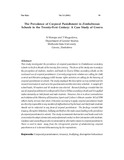Please use this identifier to cite or link to this item:
https://cris.library.msu.ac.zw//handle/11408/396| Title: | The prevalence of corporal punishment in Zimbabwean schools in the Twenty-First century: A Case study of Gweru | Authors: | Matope, N. Mugodzwa, T. #PLACEHOLDER_PARENT_METADATA_VALUE# #PLACEHOLDER_PARENT_METADATA_VALUE# |
Keywords: | Corporal punishment Truancy |
Issue Date: | 2011 | Publisher: | Midlands State University | Series/Report no.: | Vol. 5;No. 2 | Abstract: | This study investigated the prevalence of corporal punishment in Zimbabwean secondary schools in the first decade of the twenty first century. The focus of the study was to analyse the perceptions of students, teachers and heads in Gweru Urban secondary schools on the continued use of corporal punishment. Currently progressive scholars are calling for child centred and liberative pedagogy while human rights activists are calling for the banning of corporal punishment in schools. The study employed the descriptive survey method and the research instruments used were the questionnaire and the interview schedule. A sample of 5school heads, 30 teachers and 45 students was selected. Research findings revealed that the use of corporal punishment is widespread in Gweru Urban secondary schools and it is applied indiscriminately on both female and male students. However, this is in direct contradiction and violation of the Ministry of Education, Sports and Cultures Minute number 362 of 1998which clearly stresses that where it becomes necessary to apply corporal punishment heads are directly responsible or any member of staff authorized by the head, and that female not be subjected to any form of corporal punishment. The findings revealed that truancy, disruptive behaviour, bullying and theft are the main causes leading to the prevalence of corporal punishment in schools. The study recommends that teachers and heads need to be conscientised to adopt a democratic and professional conduct in their interaction with students. Guidance and counselling are also recommended as alternative means to corporal punishment. There is need to move away from the retrogressive practice of administering corporal punishment as it is deemed dehumanizing by the respondents. | URI: | http://hdl.handle.net/11408/396 | ISSN: | 1815-9036 |
| Appears in Collections: | Research Papers |
Files in This Item:
| File | Description | Size | Format | |
|---|---|---|---|---|
| matope.pdf | 106.05 kB | Adobe PDF |  View/Open |
Page view(s)
128
checked on Feb 11, 2026
Download(s)
76
checked on Feb 11, 2026
Google ScholarTM
Check
Items in MSUIR are protected by copyright, with all rights reserved, unless otherwise indicated.



